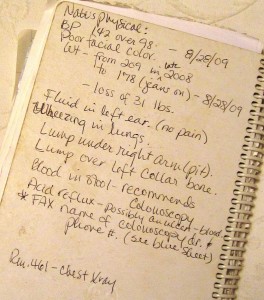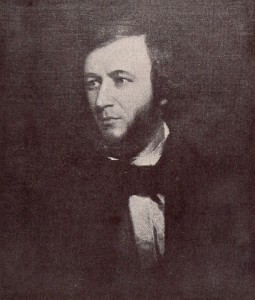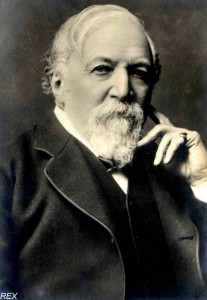Last night I came across a hand-written page of information I hadn’t seen in years. It was a few brief notes taken on the back cover of a 5 x 7 spiral notebook. I recognized the data as my speed-scribbling during Nate’s doctor appointment in August of 2009, one month before we learned of his cancer.
 Nate was scheduled for back surgery to relieve the pain of multiple herniated discs and needed a pre-op physical. Though his pancreatic cancer was advanced by then, we didn’t know anything about it, and except for his back pain, he felt fine going into the exam.
Nate was scheduled for back surgery to relieve the pain of multiple herniated discs and needed a pre-op physical. Though his pancreatic cancer was advanced by then, we didn’t know anything about it, and except for his back pain, he felt fine going into the exam.
He’d lost 31 pounds in preceding weeks but had been trying to do so after breaking the 200 pound mark on the scale. By eating smaller portions and skipping desserts, he was approaching his goal and felt good about that. People were complimenting his weight loss.
 My brief notes summarized the internist’s comments as he examined Nate:
My brief notes summarized the internist’s comments as he examined Nate:
- BP – 142 over 98
- Poor facial color
- Weight – 178 (jeans on)
- Fluid in left ear (no pain)
- Wheezing in lungs
- Lump under right arm (pit)
- Lump over left collar bone
- Blood in stool – recommends colonoscopy
- Acid reflux – possibly an ulcer – blood
The doctor recommended a colonoscopy and endoscopy, promising to FAX the name and number of the correct office to us. And as Nate was being directed to radiology for a chest x-ray, the doctor said goodbye, telling us he’d call with blood test results in a few days.
That afternoon as we drove from Chicago back to Michigan, neither of us was worried. Sure, Nate’s blood pressure was higher than his usual 110/70, but we attributed that to his severe back pain, coupled with work stress. Besides, both of us had watched the doctor carefully, not sensing any apprehension on his part as he’d examined Nate.
In a few days, though, disturbing news began filtering back to us. “Your blood numbers seemed a bit off, so we’d like to do a few more tests.” Even that, however, didn’t bother us. “It’s probably nothing,” Nate said. He had lived 64 years with flawless health and had no personal doctor. Surely nothing was wrong.
It was a classic case of poor listening; we heard only what we wanted to hear.
* * * * * * * *
Physical stats aren’t the only things people mishear. Often we’re listening for information from God, but what we want to hear gets in the way of what he’s really saying. It’s difficult to sweep away the clutter of preconceived ideas and wishes, but if start there, we’ll gradually become better listeners.
The best way to accomplish that is to ask God to clear our minds of unnecessary information when we’re trying to hear him. He’s glad we’re listening and because of that, he’ll bless us with a clear focus.
And to our benefit, he’ll do that whether we’re listening to him, to a doctor, or to anyone else.
“Dear friend, listen well to My words; tune your ears to My voice…. Concentrate!” (Proverbs 4:20-21, The Message)




